#copied directly from wikipedia
Explore tagged Tumblr posts
Text
Cast
Daniel Craig as Benoit Blanc, a private detective/investigator
Josh O'Connor as a priest
Glenn Close
Josh Brolin as Father Frank, a priest
Mila Kunis as G. Scott, a police chief
Jeremy Renner
Kerry Washington
Andrew Scott
Cailee Spaeny
Daryl McCormack
Thomas Haden Church
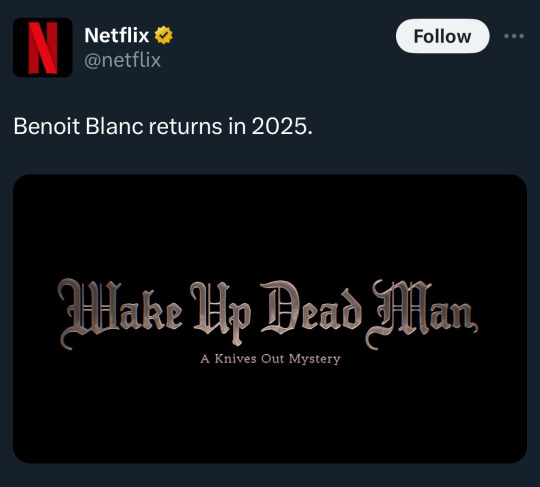
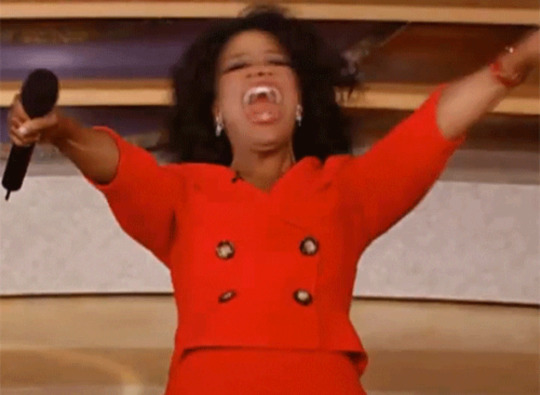
69K notes
·
View notes
Note
somebody made a post claiming you said anyone who went to michfest back in the day is transphobic, i didnt believe the post but you should know about this rumor about you
well Michfest segregated trans women from attendance as a policy for decades, and everybody who attended this from at least the 90s onwards was intimately & personally aware of that segregation, because Camp Trans protested outside every single year.
just from a glance at the opening paragraph of wikipedia, you’d find out that The Human Rights Campaign, GLAAD, the National Center for Lesbian Rights, and the National LGBTQ Task Force all publicly opposed Michfest & its transphobic policies. even fucking celebrities like The Indigo Girls announced in 2013 they would not be returning or performing again whilst the exclusionary policy was still in place — which it was, right up until Michfest stopped in 2015 due to lack of support & constant boycotts.
i need yall to understand Michfest wasn’t like… incidentally transphobic, this was a massive massive conversation all throughout the 90s until 2015. Dyke Marches were canceling performances from musicians who attended Michfest, because it was universally seen as dirty, bigoted, “I got mine” behaviour to anybody who gave a fuck about trans rights.
Like, I have to reiterate; Michfest was a music festival that by policy segregated trans women (and trans women specifically by the way). It is segregation. Yes I fucking think everybody who happily attended SegrationFest, known for the violent hatecrimes & sexual assault that routinely happened to trans women who snuck in, and hasn’t apologised for it is transphobic.
Alison Bechdel was talking positively about Michfest being free from “the male socialised” (read: trans women) in 2017. Her most recent book, which only came out a couple years ago, openly praised it for its segregation policy.
It’s not a rumour, I think it: Michfest attendees are/were all terfs. The word terf was literally coined to describe Michfest attendees. By even the most basic & oldest usecase of the word, Alison Bechdel is definitionally a terf. just because she drew a nice cartoon or two about us doesn’t change the fact all her idols were terfs and all the people she hung out with were terfs and her politics are copy-pasted directly from the terf playbook.
1K notes
·
View notes
Text
posting this feels like I'm crawling out of my grave and gasping for air
anyway- inspired by this post by @inthedarknessofnight
here's 1.3k of concert photographer!Steve and rockstar!Eddie because I couldn't get this out of my head
gimme, gimme more
1.3k words | this is the most g-rated thing I've ever written, it won't happen again
Steve’s feet hurt.
They always do after a show, but this one was particularly hard on him.
He’s been at this venue for two years now and shot countless shows in that time. But never in his career has he been challenged so– athletically.
The photo pit at this place is light years better than his last venue. There’s more than enough room for all of the photographers and their gear without stepping on each other. Usually Steve is grateful for this because surely there is only so many more beatings his 35mm can take before it kicks the bucket. Today though, he’s grateful for the space because of the full-tilt sprint this band had him in.
He’s never seen anything like it.
Well, less so did the band have him in a sprint and more so the frontman but, semantics.
The guy is everywhere. Steve could barely keep up with the way he ran around stage, jumping, climbing on equipment, leaning off-stage toward the barricade.
It was fun but Jesus, what is his deal?
Steve hadn’t even known who Corroded Coffin was 24 hours ago. Now he’s burned through two SD cards in an hour and a half.
The guy’s hot and a good photo subject, sue him.
Well, he thinks he’s a good photo subject at least. He won’t know until he’s culled through every single shot. Steve’s a good photographer, took to it naturally the first time he picked up a camera. His downfall though, according to his college professors at least, was that he pays absolutely no attention to what he’s shooting while he’s shooting it. Hence the overshooting.
On more than one occasion he’s gotten started on editing and someone is wearing an outfit he’s never seen before, someone’s got sunglasses on in every photo, a tag hanging off their jacket. All he’s concerned with is the framing, the lighting, and the focus. The content can be a problem for Future Steve. Everything can be fixed in post.
Almost.
Anyway, his feet hurt and he hates culling, so he pours himself a full glass of wine and plops down on the couch in front of an episode of trash tv with his laptop and props his feet up. Settles in for a long night.
2,461 images.
He throws his head back with a groan. Ugh.
The first hundred or so are garbage.
They always are.
A few shots spent fucking with the exposure, a few the focus, some the flash.
He denotes the purple flag as his ‘good’ tag and orange as his ‘trash’ tag. The orange is stacking up fast. Around 163 he starts finding some good images. Ones that aren’t tainted by motion blur from his running around after this frontman.
His photos of the drummer are pretty sick; he can't lie. The lights and the smoke and the near-manic smile on his face make for great photos. He’s not even this band’s personal photographer but he can imagine at least one of these will get posted to the band's socials. He’s good, what can he say?
He has a good bit of the bassist, his energy infectious enough you can almost feel it through the screen. Purple is making a comeback.
He finally gets through some crowd pics, some more drummer, some guitarist, some detail shots before he finally makes it to the frontman. 731 photos later.
What did Wikipedia say his name was? Eddie, he thinks.
Weird, the very first shot Steve has of him he’s making fierce eye contact with the camera.
Ew.
No matter how long Steve does this, photos of people looking directly at the camera never get less jarring.
Orange tag. Trash.
The next one is exactly the same.
Shit.
He’s really bad to fall victim to the high speed shutter on this camera and often finds himself with a dozen copies of the same picture. Looks like he’s done it again.
Orange.
More piercing eye contact.
What? He squints and flips back and forth between the last two photos.
They’re not even remotely similar. As a matter of fact, Steve was in a completely different location in the pit for the second one.
Green tag. Come back to this.
Taking a long swig from his glass he shifts so his laptop is closer to his face. Thinks that surely he’s not seeing this right.
He takes to forgoing his tagging system and just flipping through every photo as fast as his fingers can press the arrow keys.
He’s clicked through about 200 when he starts getting worried, his heart rate speeding up. Surely he got something usable.
“What the fuck?”
He’s clicked through 50 or 60 more when he decides that, no he did not fall victim to the shutter speed at all. This guy is just making direct eye contact with his camera in every single photo.
Steve’s not mad, the opposite really. He didn’t spend much time looking at the guy during the show and now he gets to have an eyeful while he works. What’s there to be mad about?
He is, however, mildly concerned that he won’t have a single decent photo to use for the venue socials when he posts about this show.
Whatever. Maybe fans of their music are also fans of uncomfortable eye contact. Who knows?
He finishes sifting through the rest of the photos, Eddie staring directly down the lens in every one, one’s where he’s not the subject included. Throws them all in an editing software and mass edits them all at once. He’ll detail edit later.
While the eye contact was a little unsettling, he did get one photo he’s particularly happy with. One that makes it look like the staring was on purpose.
It’s during the second to last song, a ballad– or as close as you can get with a metal band. Eddie’s standing center-stage and Steve had snagged the spot directly in front of him. He’s looking straight down, backlit with red spotlights, surrounded by smoke pumping from side-stage, and just close enough that Steve can see the sweat dripping down his neck. He looks a little bit scary, but that’s how Steve likes ‘em.
That’ll be the cover photo for sure.
He shoots an album link to his boss to review before he distributes them anywhere, then spends the next twenty minutes laughing to himself while he collects the goofiest photos of Eddie staring straight at his lens.
He puts them in a new album and copies the link.
When he opens up Instagram and searches Corroded Coffin he lets out a low whistle at the six million followers. Maybe he really should know who these guys are. With that many followers he doubts they’ll even see a message from his personal account, but whatever. He clicks on the message button on their profile and hits paste.
@ steveharrington.jpeg Great show tonight! Somebody tell this guy that he is allowed to look away from the camera though…
He only waits a few minutes for the reply.
@ corrodedcoffin HOLY SHIT THAT WAS YOU
@ corrodedcoffin Wait hang on
His phone pings with a message from a new account.
@ whoiseddiemunson HOLY SHIT THAT WAS YOU
@ whoiseddiemunson Sweetheart I wasn’t looking at the camera
Steve furrows his brows, confused. Starts typing a response but gets interrupted by another message.
@ whoiseddiemunson I was looking at the smoking hot guy behind it. Kinda hard to get a good look when he’s hiding behind the camera though.
Steve feels his cheeks flush and huffs a laugh to himself.
@ steveharrington.jpeg Well the guy behind the camera did manage to get a few good ones even though he was under surveillance the whole show. Wanna see those?
@ whoiseddiemunson Hell yeah I do. I just scrolled through your profile, your work is amazing. Do you want to show me the rest? Maybe over coffee tomorrow?
Steve smiles. His earlier heart palpitations replaced with butterflies.
@ steveharrington.jpeg Is this a date?
@ whoiseddiemunson It better be
#gin writes#I never thought that tag would see the light of day again#gin wrote#steddie#eddie munson#steve harrington#shot of gin#I am a photographer and have way too much inside knowledge to NOT write something with this#allow me to info dump at you rq#steddie fic#this is only 1.3k words and it took a LOT out of me#how I ever used to write full length fic is beyond me#good on past gin#because#present gin is WORN OUT#author has been listening to a lot of Britney Spears#hence the title#you can just be literally so back whenever you want#and I’m so back
657 notes
·
View notes
Text
not only langblr music resources
people irl often ask me where the heck i find the music i listen to, so i figured i might as well make a handy resource masterpost!
Radio Garden: Listen to radio stations all over the world. You can save your favourite stations, explore radio playlists, and search for stations in specific countries or cities. Love this one. You can download the app (android and apple) or listen via your preferred browser.
Radiooooo: Lets you choose a country, a decade, and a 'genre' (slow, fast, or weird) to listen to. You can download the app (android and apple) or listen via your preferred browser.
Charts: Charts can be tricky if you're looking for music in a specific language since there are multiple languages present in most country specific charts. It is nevertheless worth checking them out. Top 40 Charts or Popnable are your places to go. Popnable has some additional features like playlists that you can find in the "Discover" section.
beehype: Filter music by continent or country. Main page shows featured articles to browse.
Tunefind: Heard a song in a film or tv show that you enjoy but can't find it in the credits? This is the website for you! I use it when shazam fails me or when I'm at the cinema and can't use it or w/e. The songs sometimes come with a description of the corresponding scene for easy checking. Just very handy to have on hand.
Last.fm: Copy this link template: https://www.last.fm/tag/[nationality]/artists and replace [nationality] with a nationality you want to explore, e.g. "french", "chinese" etc.
Wikipedia: Type into the search bar "music of [country]", e.g. "music of slovakia", "music of botswana" etc.
Local events: Check for concerts etc. in your area. I know this is not an option for everyone for a bunch of reasons, but if it is for you, visiting local concerts can be a gold mine. I got like ten whole new songs in spanish and one in rapanui from one event I went to (it was like a culture fest with singing, dancing, and poetry). Also listening to live music just connects you differently to the art imo.
Friends & Acquaintances: Last but not least; sometimes my nosiness beats my social anxiety and I simply ask people what they like to listen to. If I'm being extra confident, I ask if they listen to music in languages other than english. Go forth and ask people about their music, go go go!!
Spotify specific recs:
Every Noise At Once: Sounds overwhelming - and tbh it can be. For this reason I personally prefer to look at 'Genres by Country', although there are many other interesting playlists to look at, such as 'We Built This City On' or 'The Sounds of Places'. You can find more if you scroll all the way to the bottom. Unfortunately, due to the layoff of the creator of this site, some features are not available anymore. This website is entirely based on Spotify.
Discover Quickly: This one might become a game changer for me personally. How it works: Log in with your spotify account. Choose one of your playlists, saved albums, followed artists etc. All relevant songs will show up as tiny thumbnails. You will hear a sample when hovering over them. Klicking on one of the thumbnails will lead you to the artist's overall releases as well as related artists. You can add your finds directly to a playlist!
LindsayDoesLanguages: Individual language playlists + more
Shameless self promo - my own account with individual language playlists. Also on YouTube !
700+ Languages: A playlist by Matthew Bofenkamp that contains one (1) song per language, and as it says on the tin, Matthew has so far collected songs in over 700 languages. Might be a good starting point for more music in your language of interest! Accompanying g0ogle spreadsheet with youtube links here.
One Song in Every Language: A community playlist by looky_dooky that aims to collect one song in every language. Everyone with a spotify account can contribute.
Another research tip: If you're on desktop, a good way to find language specific playlists is to go to any artist's profile and scroll down to the "Discovered on" section, then click "show all". Voilà!

(These showed up when I visited Haleluya Tekletsadik's page)
#. these are all i can think of rn#. might update accordingly#. also i simply assumed everyone knows what shazam is so i left it out#. anyway ! yeet.#langblr#resources#language resources#music resources#music#l#r.txt
561 notes
·
View notes
Text
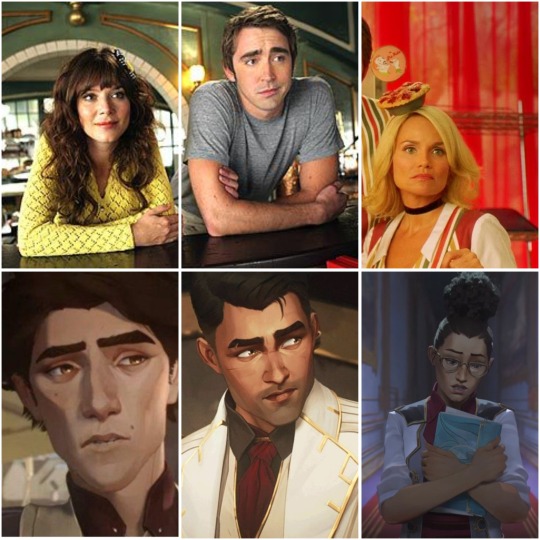
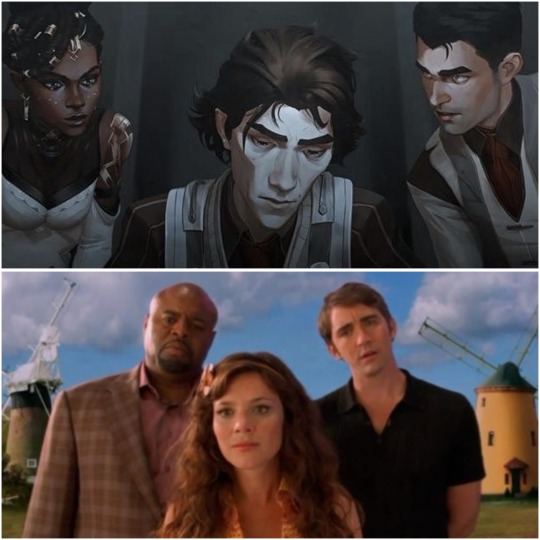
Please someone write a crossover between Arcane and Pushing Daisies.
"Pushing Daisies centers on the life of Ned, a pie-maker gifted with the ability to reanimate the dead by touching them. If something is revived for more than one minute, a similar "life value" in the vicinity drops dead as a form of balance. If he touches the revived person or thing a second time, they die permanently.
As a child, he brings back his mother when she dies of an aneurysm. This causes the death of the father of his neighbor and childhood sweetheart, Charlotte "Chuck" Charles. That night, Ned's mother falls dead permanently when she kisses him goodnight. Chuck's agoraphobic aunts, Vivian and Lily, move in to care for her and Ned is sent by his father to a boarding school, separating the children.
Ned becomes a pie-maker and opens a restaurant called The Pie Hole. He is aided by waitress Olive Snook, who pines for him. The restaurant is failing financially when private investigator Emerson Cod accidentally discovers Ned's powers and offers a proposal: Ned will temporarily bring murder victims back to life, allowing Emerson to inquire about the circumstances of their death, quickly solve the case, and split the reward money with him." Plot copied directly from Wikipedia.
#Arcane#arcane crossover#pushing daisies#viktor arcane#viktor#jayvik#jayce talis#sky young#mel medarda#the piemaker#Emerson cod#olive snook
32 notes
·
View notes
Text
the heat death of the universe
gregory bennet
You want to order from a local restaurant, but you need to download a third-party delivery app, even though you plan to pick it up yourself. The prices and menu on the app are different to what you saw in the window. When you download a second app the prices are different again. You ring the restaurant directly and it says the number is no longer in service. You go to the restaurant and order in person. You mention that their website has the wrong number and the woman behind the counter says they have to contact the company who designed the site for changes, which will cost them, but most people just order through an app anyway. You want to watch the trailer for an upcoming movie on YouTube but you first have to sit through an ad. Then you sit through a preview for the trailer itself. Then you watch the trailer, which is literally another ad. When it ends, it cues up a new trailer, with a new ad at the start of it. [...] Your friend has a short story published online but you need to pay for a subscription to the site in order to read it. You message them and ask if you could get a copy. They say ‘sure’ and send you a PDF. You read the story and like it. You are curious about one detail. You message them for more information and they recommend checking out the Wikipedia page. You read the Wikipedia entry and there is a lot of useful information supplied by a community. One of the sources cited is a non-fiction book. You go to your local library’s website and although they don’t have the exact book, they do have others by the same author. You place a hold on two of them, then go get your shoes on.
145 notes
·
View notes
Text
Artists who blatantly copy Lana Del Rey with no originality.
1 - Remy Bond.

Remy blatantly copying Lizzy Grant.
Remy coping Lana in concert too.
Lanaboards destroyed her in their thread.
Some tea on Remy and her upbringing from a follower who reblogged my post!
2 -Saint Avangeline.
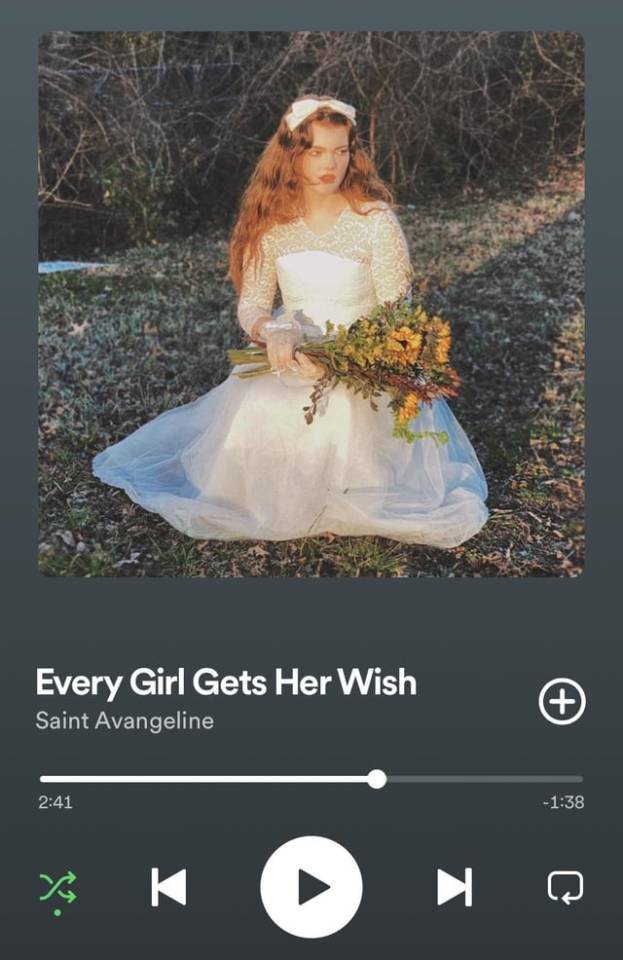
Some songs she's done covering Lana: Every Man Gets His Wish, Brooklyn Baby, Young and Beautiful, High By The Beach and Shades of Cool. She's done her own "original" songs but they also sound like Lana. Songs like Lilith is a complete copy of Lana's song Ultraviolence. Her album Gardener of Eden sounds like anything from Ultraviolence or Honeymoon. Saint Evangeline nowadays is doing heavy metal music. She's erased anything Lana related off her Instagram and Youtube playlists, but some of her Lana covers have remained on Youtube.
Places like Reddit have brought up Saint Evangeline's blatantly coping Lana. They brought it up Twice.
3 - Nessa Barrett
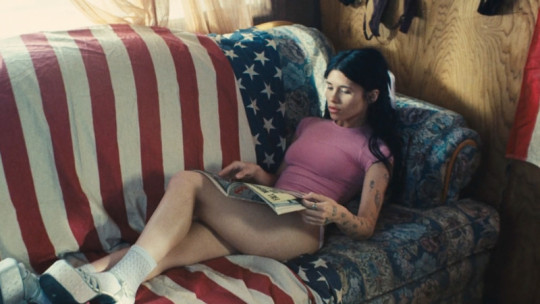
American Jesus. Heartbreak in the Hamptons. God's Favorite.
Lana brought her up on stage once, angering Lana's fanbase. At least Lana is aware of her. So did Reddit. Twice.
4 - Ocean Leclaire.
This artist has morphed into Lana over time. She started as a folky Florence Welch but now is doing more 'Lana' in sound and look. An obvious Lana fan too.
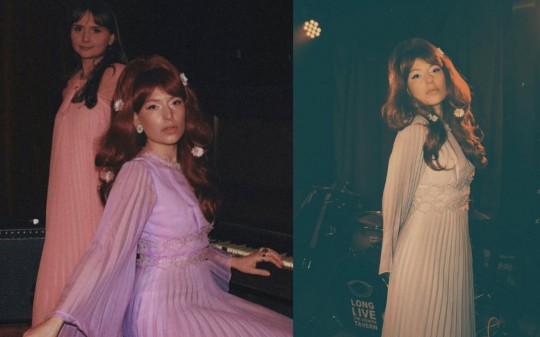
Notable Mentions:
Camilla Cabello.
An entire monolugue music video in the style of Lana Del Rey. When Lana saw the video her reaction was "what the hell."
youtube
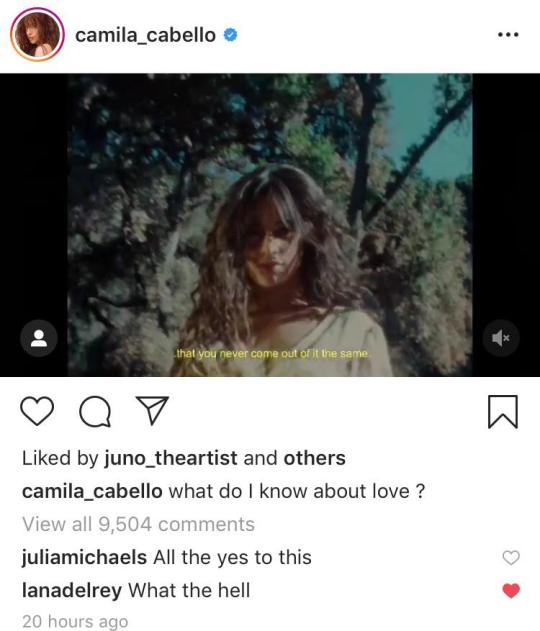
Taylor Swift.
youtube
Taylor not only copied the monologue style like Lana, but she hired Lana's ex-boyfriend Reeve Carney to play her boyfriend.
youtube
Taylor also had the same chorus vocal melodies as Lana's song "Without You" for her song "Wildest Dreams." The song and music video was very reminiscent to Lana's visuals. Parts of another Taylor video was similar to Lana's music video Summertime Sadness, especially the silhouette scenes. There's was also the brunette wig and glamour look.
Holly Macve.
Lana is actually a fan of Holly's. Lana and Holly sang together for Holly's song Suburban House. Holly is not a exact copy and paste of Lana Del Rey as the other girlies I mentioned, but she's obviously inspired by Lana.
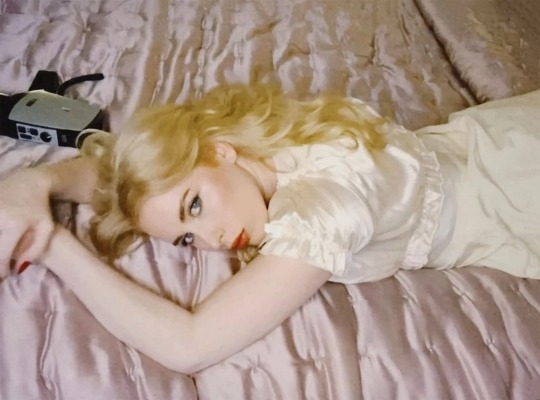
Ethel Cain.
All you need to do is listen to Crush or American Teenager to hear Lana Del Rey's influence. The music videos were shot in a 90's amateurish way like Lana use to create her videos. The tone of the songs and imagery is reminiscent to Born To Die and Ultraviolence.
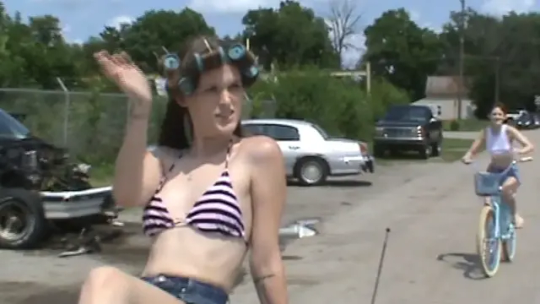
Fans were able to connect the dots and see that Ethel was greatly inspired by Lana. The press caught on too. Ethel didn't like that and began to edit her Wikipedia page as 'papermassacred' by removing any mention of Lana Del Rey in her Wikipedia page. Ethel went even further saying this about Lana during an interview:
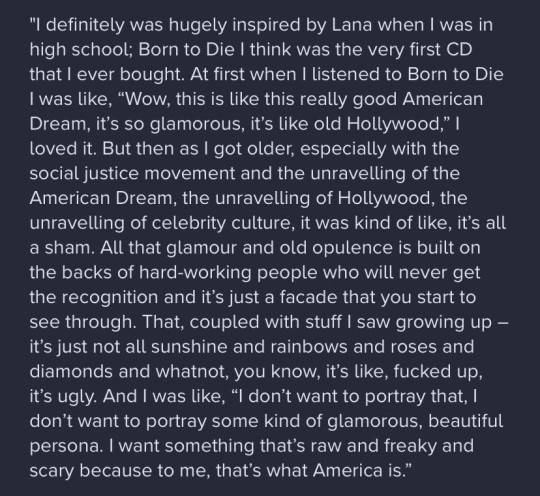
Lana fans were pissed off when Ethel said this and I'm sure it got to Lana too. It's rumored that Lana wrote a diss track called 'All About Ethel' that hasn't been released yet.
Billie Eilish

Billie is only mentioned here for her immense admiration, influence and respect for Lana Del Rey. She is inspired by Lana but she is her own person. She's not putting bows in her hair, wearing a bouffant, dressing like Lana or directly copying Lana's songs or music videos. Lana invited Billie to her Coachella stage to sing Ocean Eyes and Video Games.
Kali Uchis

Kali's new album Sincerely sounds like it was inspired by Born To Die and Honeymoon. She sings a part of her song "Silk Lingerie" like Lana's song Million Dollar Man. This melody is a blatant rip off of Lana's vocal melody.
#lana del rey#nessa barrett#saint avangeline#remy bond#holly macve#taylor swift#olivia rodrigo#billie eilish#camilla cabello#ocean leclaire#copycats#kali uchis#Youtube
121 notes
·
View notes
Text
clarification re: ChatGPT, " a a a a", and data leakage
In August, I posted:
For a good time, try sending chatGPT the string ` a` repeated 1000 times. Like " a a a" (etc). Make sure the spaces are in there. Trust me.
People are talking about this trick again, thanks to a recent paper by Nasr et al that investigates how often LLMs regurgitate exact quotes from their training data.
The paper is an impressive technical achievement, and the results are very interesting.
Unfortunately, the online hive-mind consensus about this paper is something like:
When you do this "attack" to ChatGPT -- where you send it the letter 'a' many times, or make it write 'poem' over and over, or the like -- it prints out a bunch of its own training data. Previously, people had noted that the stuff it prints out after the attack looks like training data. Now, we know why: because it really is training data.
It's unfortunate that people believe this, because it's false. Or at best, a mixture of "false" and "confused and misleadingly incomplete."
The paper
So, what does the paper show?
The authors do a lot of stuff, building on a lot of previous work, and I won't try to summarize it all here.
But in brief, they try to estimate how easy it is to "extract" training data from LLMs, moving successively through 3 categories of LLMs that are progressively harder to analyze:
"Base model" LLMs with publicly released weights and publicly released training data.
"Base model" LLMs with publicly released weights, but undisclosed training data.
LLMs that are totally private, and are also finetuned for instruction-following or for chat, rather than being base models. (ChatGPT falls into this category.)
Category #1: open weights, open data
In their experiment on category #1, they prompt the models with hundreds of millions of brief phrases chosen randomly from Wikipedia. Then they check what fraction of the generated outputs constitute verbatim quotations from the training data.
Because category #1 has open weights, they can afford to do this hundreds of millions of times (there are no API costs to pay). And because the training data is open, they can directly check whether or not any given output appears in that data.
In category #1, the fraction of outputs that are exact copies of training data ranges from ~0.1% to ~1.5%, depending on the model.
Category #2: open weights, private data
In category #2, the training data is unavailable. The authors solve this problem by constructing "AuxDataset," a giant Frankenstein assemblage of all the major public training datasets, and then searching for outputs in AuxDataset.
This approach can have false negatives, since the model might be regurgitating private training data that isn't in AuxDataset. But it shouldn't have many false positives: if the model spits out some long string of text that appears in AuxDataset, then it's probably the case that the same string appeared in the model's training data, as opposed to the model spontaneously "reinventing" it.
So, the AuxDataset approach gives you lower bounds. Unsurprisingly, the fractions in this experiment are a bit lower, compared to the Category #1 experiment. But not that much lower, ranging from ~0.05% to ~1%.
Category #3: private everything + chat tuning
Finally, they do an experiment with ChatGPT. (Well, ChatGPT and gpt-3.5-turbo-instruct, but I'm ignoring the latter for space here.)
ChatGPT presents several new challenges.
First, the model is only accessible through an API, and it would cost too much money to call the API hundreds of millions of times. So, they have to make do with a much smaller sample size.
A more substantial challenge has to do with the model's chat tuning.
All the other models evaluated in this paper were base models: they were trained to imitate a wide range of text data, and that was that. If you give them some text, like a random short phrase from Wikipedia, they will try to write the next part, in a manner that sounds like the data they were trained on.
However, if you give ChatGPT a random short phrase from Wikipedia, it will not try to complete it. It will, instead, say something like "Sorry, I don't know what that means" or "Is there something specific I can do for you?"
So their random-short-phrase-from-Wikipedia method, which worked for base models, is not going to work for ChatGPT.
Fortuitously, there happens to be a weird bug in ChatGPT that makes it behave like a base model!
Namely, the "trick" where you ask it to repeat a token, or just send it a bunch of pre-prepared repetitions.
Using this trick is still different from prompting a base model. You can't specify a "prompt," like a random-short-phrase-from-Wikipedia, for the model to complete. You just start the repetition ball rolling, and then at some point, it starts generating some arbitrarily chosen type of document in a base-model-like way.
Still, this is good enough: we can do the trick, and then check the output against AuxDataset. If the generated text appears in AuxDataset, then ChatGPT was probably trained on that text at some point.
If you do this, you get a fraction of 3%.
This is somewhat higher than all the other numbers we saw above, especially the other ones obtained using AuxDataset.
On the other hand, the numbers varied a lot between models, and ChatGPT is probably an outlier in various ways when you're comparing it to a bunch of open models.
So, this result seems consistent with the interpretation that the attack just makes ChatGPT behave like a base model. Base models -- it turns out -- tend to regurgitate their training data occasionally, under conditions like these ones; if you make ChatGPT behave like a base model, then it does too.
Language model behaves like language model, news at 11
Since this paper came out, a number of people have pinged me on twitter or whatever, telling me about how this attack "makes ChatGPT leak data," like this is some scandalous new finding about the attack specifically.
(I made some posts saying I didn't think the attack was "leaking data" -- by which I meant ChatGPT user data, which was a weirdly common theory at the time -- so of course, now some people are telling me that I was wrong on this score.)
This interpretation seems totally misguided to me.
Every result in the paper is consistent with the banal interpretation that the attack just makes ChatGPT behave like a base model.
That is, it makes it behave the way all LLMs used to behave, up until very recently.
I guess there are a lot of people around now who have never used an LLM that wasn't tuned for chat; who don't know that the "post-attack content" we see from ChatGPT is not some weird new behavior in need of a new, probably alarming explanation; who don't know that it is actually a very familiar thing, which any base model will give you immediately if you ask. But it is. It's base model behavior, nothing more.
Behaving like a base model implies regurgitation of training data some small fraction of the time, because base models do that. And only because base models do, in fact, do that. Not for any extra reason that's special to this attack.
(Or at least, if there is some extra reason, the paper gives us no evidence of its existence.)
The paper itself is less clear than I would like about this. In a footnote, it cites my tweet on the original attack (which I appreciate!), but it does so in a way that draws a confusing link between the attack and data regurgitation:
In fact, in early August, a month after we initial discovered this attack, multiple independent researchers discovered the underlying exploit used in our paper, but, like us initially, they did not realize that the model was regenerating training data, e.g., https://twitter.com/nostalgebraist/status/1686576041803096065.
Did I "not realize that the model was regenerating training data"? I mean . . . sort of? But then again, not really?
I knew from earlier papers (and personal experience, like the "Hedonist Sovereign" thing here) that base models occasionally produce exact quotations from their training data. And my reaction to the attack was, "it looks like it's behaving like a base model."
It would be surprising if, after the attack, ChatGPT never produced an exact quotation from training data. That would be a difference between ChatGPT's underlying base model and all other known LLM base models.
And the new paper shows that -- unsurprisingly -- there is no such difference. They all do this at some rate, and ChatGPT's rate is 3%, plus or minus something or other.
3% is not zero, but it's not very large, either.
If you do the attack to ChatGPT, and then think "wow, this output looks like what I imagine training data probably looks like," it is nonetheless probably not training data. It is probably, instead, a skilled mimicry of training data. (Remember that "skilled mimicry of training data" is what LLMs are trained to do.)
And remember, too, that base models used to be OpenAI's entire product offering. Indeed, their API still offers some base models! If you want to extract training data from a private OpenAI model, you can just interact with these guys normally, and they'll spit out their training data some small % of the time.
The only value added by the attack, here, is its ability to make ChatGPT specifically behave in the way that davinci-002 already does, naturally, without any tricks.
265 notes
·
View notes
Text

Wednesday matinee Intermission pic! Behold (again) Mrs Wingate's housekeeper, Geraldine! (With the correct collar this time!) #actorslife #actor #goodspeedsummerstock #musicaltheatre #ensemble #understudy #worldpremiere

Is it "Nan," the wardrobe mistress, or is it Lucille Ball? 😉 #actorslife #goodspeedsummerstock #newmusical #worldpremiere #costumes #characteractor
so the film's role of the housekeeper at falbury farm (which jane inherited from her late father) who is then Around, helping out, apparently having known the sisters at least from childhood and having fun facts about it, and going from disapproving towards the whole notion of thee performance arts to implicitly having dropped that due to supporting jane from backstage, and is basically like some older family member, is presumably supplanted by pop falbury, who could then do all that & more, makes sense. but we get An housekeeper as an ensemble part lol

Behold Mrs Wingate's housekeeper, Geraldine! 😉 #intermissionselfie #intermissionpic #newmusical #musicaltheatre #musicals
which, great time to point out the intrigue around, say, the second act one scene set at the wingate house, like, what is montgomery, fancy would-be lead actor in the show within the show, doing there at all? would love to know
#summer stock#universe in which lucille ball got her start as [name of show in this show]'s wardrobe mistress then#which reminds me i went ''oh; huh'' when looking up eddie bracken (actor who plays orville in '50 film) and learning one film he was in#was where lucille ball & desi arnaz met. was thinking the other day abt how they just didn't do tv reruns until i love lucy#and this was also b/c of the show innovating by being on film instead of kinoscope so that....smthing smthing like#to get the nationwide scheduling they wanted One version would've had to be a second generation copy film of what was filmed?#and if it was the lower kinoscope quality in the first place then the west coast's nonLive aired copy of it would be too shitty lol. i Thin#let's all read the i love lucy &/or perhaps desilu productions &/or lucille ball wikipedia pages#but also before that it was like ''why would people want to watch something they'd seen before'' which Lol. Lmao.#but it's a sentiment that also lines up w/the forever resurfacing twitter qrt memes like name 5 films you've seen more than three times :)#like lol binch. that's abt the Minimum for if i liked something i've seen at all....#or ppl like ''lol umm whoah calm down zanyface'' over how Immediately you wanna see something again. again i say: binch;#but whereas now reruns aren't synonymous with Thrilling they're neither deemed unwatchable nor are unwatched; obviously#yet the assumption was just like nobody's gonna do that wild shit (sit down & enjoy something they've Already Seen)#and of course i love lucy being especially popular....Been in reruns ever since....#yeah thought of it b/c i was watching the matt baume video essay abt norman lear & that incredible influence over All Of Tv as well#and that ''all in the family'' didn't start catching on & gaining more significant popularity until the first season was in reruns#ok no wait i'm doing research. i love lucy was Filmed in the west coast & the kinoscope technique is itself that [filming a tv] copy#idk how the scheduling played into it but hence using higher quality Film instead of any kinoscoping at all. pioneering using 3 Cameras#ok yeah i thought so re: i love lucy being the first show also filmed w/Live Studio Audience. & laugh Tracks are oft its reused recordings#and the whole like ''an interracial relationship....ppl won't like that'' so they just do it as a vaudeville act first to show that they do#only recently learning Pregnancy was considered Inappropriate b/c it Implied Having Had Sex lsdfj like the stork is for Our sakes thanks...#but anyways also knew that having her character be pregnant & have a baby was also Bold(tm) & they couldn't say ''pregnant''#''enceinte'' episode title....anyways great quote here from this pbs article i'm looking at. she understood that [tv] could have the#excitment of vaudeville; the wonder of the movies; & come directly into people's homes with the intimacy of the radio
6 notes
·
View notes
Text
Since I spent like an hour on friday going through my copy of iwtv (1977 first Ballantine Books Edition) so here's where every episode title is said in the book.
possible spoilers for the show; definitely spoilers for the nearly 50 year old book.
S1E1 "In throes of increasing wonder" page 13, Louis only every directly says the words "increasing wonder" ("From then on I experienced only increasing wonder") about his first meeting with Lestat
S1E2 "...after the phantoms of your former self" page 81-82, said by Lestat ("You are in love with your mortal nature! You chase after the phantoms of your former self!") when they're having one of their many arguments about Louis' feelings about killing, right before they turn Claudia
S1E3 "Is my very nature that of a devil?" page 73, after Louis and Lestat are driven off of Louis' plantation & are rejected by a mortal woman Louis likes & thought would protect them
S1E4 "...the ruthless pursuit of blood with all a child's demanding" page 98, said by Louis about Claudia (in narration) ("She was simply unlike Lestat and me to such an extent I couldn't comprehend her; for little child she was, but also fierce killer now capable of the ruthless pursuit of blood with all a child's demanding)
S1E5 "a vile hunger for your hammering heart' page 116, Louis to Claudia, telling her the story of how she was turned ("I felt for you again, a vile unsupportable hunger for your hammering heart, this cheek, this skin.") While S2E7 gives us more context on how Claudia was turned, in the book it was very different-- Louis just straight up saw her and couldn't resist nearly killing her, & a few days later Lestat decides to turn her to save their marriage
S1E6 "Like angels put in Hell by God" page 148-- Louis says this to a priest in confessional after Lestat 'dies'. ("I am not mortal, father, but immortal and damned, like angels put in hell by God.")
S1E7 "The thing lay still" page 138, Louis' description of Lestat's dead (ish) body
S2E1 "What can the damned really say to the damned?" page 168, Louis contemplating what he might find in Eastern Europe as he and Claudia sail to Europe.
S2E2 "Do you know what it means to be loved by death?" page 224, said by Santiago in basically the exact same context, although the play is different.
S2E3 "No pain" page 225, said by Armand, who is onstage & is the one who kills the woman in the first performance we see at Theatre des Vampires
S2E4 "I want you more than anything in the world" page 284, said by Armand to Louis when they're on a little date in this abandoned tower Armand likes to hang out in, notably after Louis turns Madeline without approaching Armand about it; I believe he also repeats it twice same as the show
S2E5 "Don't be afraid. just start the tape" page 3; said by Louis to Daniel basically the same way it happens in the show.
S2E6 "Like the light by which God made the world before He made light" page 142, something Louis says while contemplating his existence directly after Lestat 'dies'. ("I had now lived in two centuries, seen the illusions of one utterly shattered by the other, been eternally young and eternally ancient, possessing no illusions, living moment to moment in a way that made me picture a silver clock ticking in a void: the painted face, the delicately carved hands looked upon by no one, looking out at no one, illuminated by a light which was not a light, like the light by which God made the world before he Had made light.") (jesus, anne. i thought i wrote horribly long sentences)
S2E7 "I could not prevent it" page 307, said by Armand, also repeated twice like he does in the show, although this is said as he's saving Louis rather than in the present day interview
S2E8 "And that's the end of it. There's nothing else" page 341; idk if this is the actual episode title, but it's what wikipedia is telling me and it makes sense enough. The last thing Louis tells to Daniel before ending the story
under the cut-- other lines i remember from the show that i underlined while reading the book; please add on if you have any more or correct anything i got wrong
(also this is all just my memory while reading the book, so it's messy and imperfect) (all of the book quotes should be correct, but forgive me if i cannot remember the lines from the show exactly and don't bother to search for them)
interview begins with "You weren't always a vampire, were you?" and then "There's a simple answer to that. I don't believe I want to give simple answers. I think I want to tell the real story." page 4
Daniel says "ah, that's the accent" and notes that there's a "slight sharpness to the vowels" also page 4
the monologue louis has about becoming a vampire "A dull roar at first and then a pounding like the pounding of a drum" to "i realized that drum was my heart" page 19
various things louis says about lestat in the first interview. i can't remember the exact lines in the episode but i think i remember "I was his complete superior and I had been sadly cheated in having him for a teacher" from page 31 and "he appeared frail and stupid to me, a man made of dried twigs with a thin, carping voice" on page 34
"The blood poured out of him, down his shirt front, down his coat. It poured as it might never pour from a mortal man, all the blood which he had filled from before the child and from the child..." page 137, describing Lestat dying
After they first attempt to kill Lestat, Louis also says the words "beginning the great adventure of our lives" page 142
page 216, when Armand and Louis meet, Armand does say "I will not harm you", and the note on his buisness card says "Bring the petit beauty with you. You are most welcome, Armand."
page 244, parts of the shpiel about concious & unconcious death from the first theatre performance
page 339, Armand says "She never loved you, you know. Not in the way that I loved you, and the way that you loved us both." after which he leaves Louis, something he hasn't managed to do in the show yet, though, to be fair, in the show after he said this Louis immediately ran into the sun
page 343, "This... after all I've told you... is what you ask for? " and "You don't know what human life is like! You've forgotten. You don't even understand the meaning of your own story...", though in the show they change this line a bit to make it sound more natural for a high 20 year old in San Francisco in 1973
62 notes
·
View notes
Text
Chapter 70 Whelmed Posting
Subdued entry this time, dear void. And I'm back to form with a way-too-long yapfest.
Scans are too potato for me to TL the editor's notes this week, sorry. Might revisit when I can get a clean copy of the JP version.
TRIGGER WARNING: This chapter mentions a very sensitive topic happening in canon (toned down in EN) and I will be talking about it near the end. I'll have another warning reminder for those who'd rather skip that part.
White Purity Mechanics and a GILF(?)
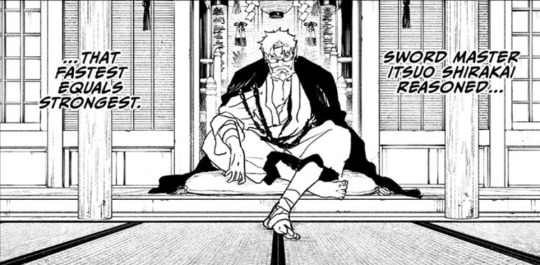
Helloooo handsome.
Wasn't expecting to see this guy yet or get detailed mechanics for how the sword style he founded works in the middle of a fight, but hey, it's fine. I guess. Awkward time for that lore dump but powerscalers will surely be happy. I'm interested in the details myself as a world-building nerd.
Short summary of his name here: Shirakai Itsuo (白廻 逸夫), the master of the White Purity style. 白廻 (shirakai) could be roughly translated as "white game" and 逸夫 (itsuo) could be idle/elusive husband lol. At the very least, shira (白) means "white" so that's most likely where that part of the technique's name came from.
As for the rest of it...
居合白禊流 - read as Iai Byaku Gei Riyuu 居合 (Iai) is obvious, that's the type of move being executed here. We know that Byaku comes from the On reading of 白 [shira, "white"]. What are the last two? 禊 is misogi, a Shinto purification ritual; it also means ritual purification or ablutions in general, and/or "...the Japanese mountain ascetic* practice of ritual purification" (thanks, Wikipedia). 流 [riyuu] is simply "school" of method.
Anyway, Hokazono-sensei hit us in the face with a wall of technical terms for how this school works and I had to admit defeat until someone I trusted translated the yap page for it... dear God. Surely the official release will not mangle anything so I won't have to bother that friend for help with TL notes.
I've been thinking that Chihiro is essentially a DPS guy out of the "holy trinity" (DPS, Support, Tank) for a bit now. He's always been about hitting fast and hard without much room for error on his part if he unexpectedly gets hit in return. Thank you, Shirakai, for proving this dumb pet theory correct. Gotta Go Fast: The Move is all about being the fastest guy in the room because if you hit them first then they can't hit you back, right?
The difficulty of mastery part is pretty standard shounen to me in order to explain why someone can't just teach Chihiro how to use it the normal way. Two 18-year-olds picked up the style on their own fairly easily, so while I know we're supposed to see that as proof of how talented those guys are, it's not really anything special to me as a reader. It's unconventional and hard to use because it needs to be for the story more than anything else.
The real meat of this explanation was how changing the grip of the sword on the fly so quickly is ackshully a metaphor for being able to change your mindset. We are continuing the old vs. new themes with the sword style directly now, since Shirakai was mocked for trying to perfect this impracticably difficult Iai move. But the "new" won out in the end since he got the last laugh over all of his detractors. His distraction-free, flexible quick thinking outdid every traditional master that faced him, or so we can infer.
Shame the second coming of this fight left me wholly unimpressed outside of Iori.
(*If you don't want to look it up, then "ascetic" is similar to "austere" in meaning and is specifically for strict self-denial mostly for religious discipline, but can apply for personal discipline too.)
"Whatever," the Fight and Iori
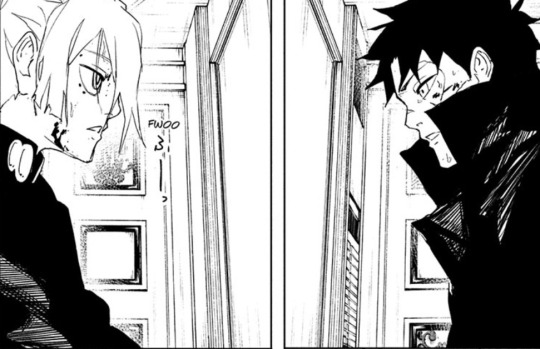
All I could think of during this scene was the two of them chilling awkwardly as pleasant background music played.
I'm not really sold on this fight, honestly. All I'm thinking right now is "good, now that it's over maybe we can go back to the interesting stuff". The poses were cool and all but the theme just isn't hitting. We flew through the buildup to this confrontation and all we got out it was Chihiro winning again despite us being reminded that he's tired, pushing himself too hard, and that Hiruhiko's coming in much fresher and scarier after killing the master of a style.
Kagurabachi's biggest strength was doing character development, exploring core themes, and having sick fights at the same time. But ever since we took a sudden swing into this Iori subplot I've felt like the author is trying to speed run it as fast as possible.
Everything through chapter 59 was awesome. We took the time to introduce characters, set up plot points, threats, and motives, had spectacle fights to get insight into Chihiro's mindset- all the same great stuff that we'd all come to expect. Then we put all that on the back-burner for something related-but-different that wasn't exactly a welcome surprise.
The author primed us for Seitei War reveals and examining guilt as part of legacy. Then the he snapped our necks 90 degrees to witness this sideshow with geniuses, old vs. new, and another thematic foil to Chihiro. Iori was meant to glue this all together and strongly connect it to the main plot we left behind in chapter 59 but it didn't work. She's just a well-designed narrative device instead of a character and I'm still waiting for this stuff to finish so we can go back to what I thought the main event was.
And yet.
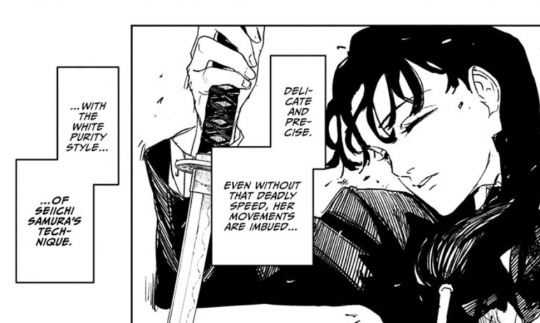
She did her best to save this arc.
I do love Iori. She's defending without killing, doing just enough to disfinger her enemies and get them out of the fight. Thanks to her example, Chihiro is able to choose a path that doesn't necessarily involve killing Hiruhiko to win. Yeah the clown is probably still going to be around (sadly for me), just hopefully in a less carnival side-show capacity and more as a proper enemy. Maybe even an object for redemption...
But this is probably going to be the foundation for Chihiro being able to redeem himself from guilt- choosing when to kill instead of thinking of it as the default option. She showed him the best swordplay comes from stilling the mind and heart to attack the reason the enemy bares their fangs, not necessarily slay them. Killing the reason they hold a sword is as effective as killing them but without all the murder stuff. Staying tuned to see if/when this comes back.
The Warning Section
Skip this if Hiruhiko's backstory reveal is not something you want to see a yap about.
The EN version toned it down but the JP and apparently some other languages are explicit. Let Hakuri protect you if you'd rather not read about a slightly different version of "assault"...

Hakuri buffer image for safety (it's super effective).
Alright. For anyone still here...

The FUCK was that about in Japanese?
In case the EN tones it down (bet they will): in the OG Japanese, the language used is very explicit: 手篭にしようと迫る成人男性を噛み殺した昼彦にとって
手篭め [tegome] is literally "rape/violation" and doesn't have any other connotations than what it says on the tin. So yeah. In canon, Hiruhiko was SA'd at 3 years old.
I'm very sensitive about how backstories involving CSA are used for personal reasons. The way it was used here for Hiruhiko did just about everything wrong, in my opinion. Completely wiped out the goodwill I had towards the author after how Hakuri's backstory was handled during the Rakuzaichi arc.
reinforced the stereotype of being SA'd as a child = deeply damaged/dangerous later in life
same-sex SA reinforced men as predators AND homophobic stereotypes
added with no context or buildup just for the easy shock value and pity points
I'm not okay with this at all. The nicest thing I can say is that it's used to explain the feral, bloodthirsty part of his nature and not the social ineptitude (which is probably a personality quirk and/or related to how he was raised). He's twisted but in a way that leans more towards empowerment through activating his survival instincts. Still not at all appreciated though.
100% of my hatred for this comes from my own struggles I'll admit. To see them reflected this poorly in a series I adore by an author I trusted to handle sensitive topics with care really did a number on me. I expected better from the author than to rely on negative stereotypes for this sort of thing and clearly I was wrong. That's my fault and I know better now.
It's fine to use CSA as part of a character's backstory but it needs to be treated with far more care than it was here.
If this had been applied to Chihiro, Hakuri, Iori, or any of the good guys instead I feel like it would have been fine. To show that even if it happens to you, it doesn't make you a bad person who can't function safely around others.
It also would have been fine if it was to show Hiruhiko's a true survivor that needed some help he probably didn't get afterwards- and that's what led him to be the freak he is. If Hiruhiko isn't dead after this chapter there's still time to get into that aspect, maybe even make a point that proper support makes all the difference in a person's outcomes after that kind of trauma. But even if that is the intent, dropping that sort of event without context is a terrible move.
To compare to other traumatic character backstories... basically, Hiruhiko's debut hint doesn't match up with the traumatic event behind it at all.
Chihiro
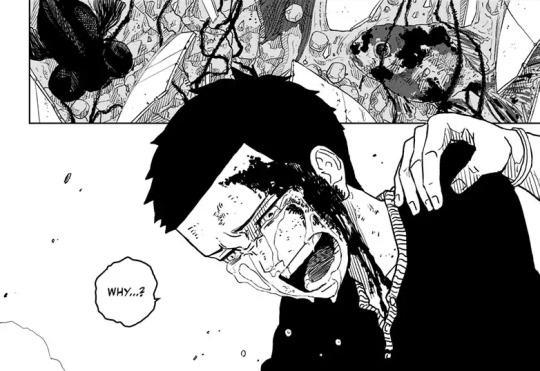
Give this boy all the hugs he can tolerate.
We see this early in chapter 2 and it's not really a surprise, since the premise of the story is that Chihiro is walking the bloody road of revenge. Something traumatic clearly happened to Kunishige due to the timeskip to "every morning I wake up with fresh hatred" Chihiro meeting Shiba alone on the train in chapter 1, so we were primed for this sort of thing. Batman origin story and all that.
Char
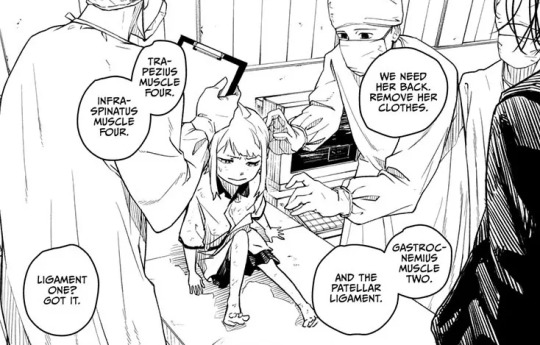
Protect her at all costs.
Char clued us in early on by appearing as a scruffy orphan in her debut chapter- whatever happened to her was not exactly pleasant. From there we slowly learned how she and her mom were experimented on, then separated forever. The logical flow of meeting her, seeing what happened, then watching Chihiro set her on the path to healing made sense. Thankfully she's going to be OK and she will never, ever have anything bad happen to her again (so help me God).
Hakuri

Someone give him all the love he's never had PLEASE.
I already wrote eight thousand words about how Hakuri's traumatic backstory was portrayed in a very realistic and hard-hitting way. The second thing we learn about him being that he "lost his family" five years ago while he's dripping soda out of his mouth on his lonesome was a good clue as to what happened, even if he and the author buried the lede on exactly how that happened and how bad he had it. He lost their love, twisted and manipulative as it was, and endured literal torture to try and earn it back until Ice Lady's suicide snapped him out of it. I honestly can't praise the writing for this character enough.
Iori
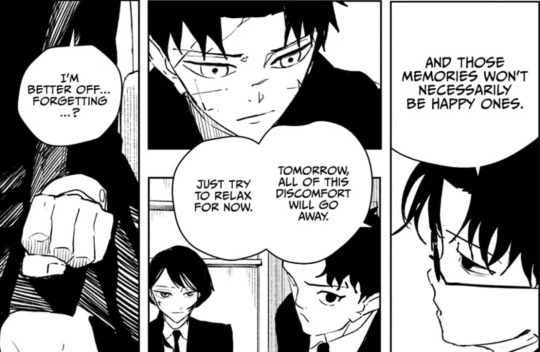
She chose her own path in the end...
Being dropped on us out of nowhere as Samura's daughter that everyone's forgotten about wasn't exactly a welcome surprise. But at least it let us know that she's got some difficult circumstances- which could have been expected since she's the daughter of the current arc boss to beat, but still. Her home was trashed and her dad abandoned her and we probably have more to see now that she's remembered everything. But all the reveals so far have been in line with the kind of trauma we'd expect to see given how she was introduced.
Hiruhiko
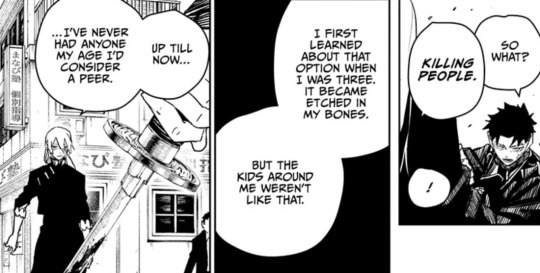
"Let's be friends, fellow murderer."
And then there's this guy.
Hakuri's the closest comparison to Hiruhiko in presentation with all the understatement going on. But we spent his intro to chapter 24 getting hints that there's something wrong with him that he wasn't talking about. Then we got context for his suicidal jump immediately afterwards, as well as even more hints that his issues go deeper than we've seen.
Hiruhiko's backstory had no build up to the reveal that he was SA'd as a toddler. We only knew he was a freaky, poorly socialised guy the same age as Chihiro who killed at the age of 3. Making us ask what circumstances would force and enable him to do such a thing was good- that's a decent hook to keep us interested in what his deal is while the immediate stuff is going on. Hokazono did it for all the other characters in this list too.
What flopped was the shocker reveal. That single line of "oh, he was assaulted by an adult man, anyway-" was pathetically delivered if it was meant to be an example of understatement. You cannot drop a heavy and sensitive backstory with no follow up. You cannot have it done by the omniscient narrator to launch into why he's such a battle genius.
The biggest problem really is that it's a convenient explanation more than something to explore like every other character's trauma was. When we got those horrific reveals, time was spent looking at them on the page and showing how it affected them. We saw Chihiro and Char crying and looking despondent, Hakuri internalising a harmful mindset about himself, now we've seen Iori pass out from the burden, waver, and will see more exploration of her difficult past to come.
But Hiruhiko, even if we do revisit this topic for him, got nothing except a long yap about what a genius of combat it made him. Nothing at all about his pain or the ramifications. If we still have more to learn about that incident then good, I fucking hope so. But it'll be too little to late for me. I don't know what I did to deserve the friends who helped pull me out of the tailspin this chapter caused, but I'm incredibly grateful to have them in my life.
So...
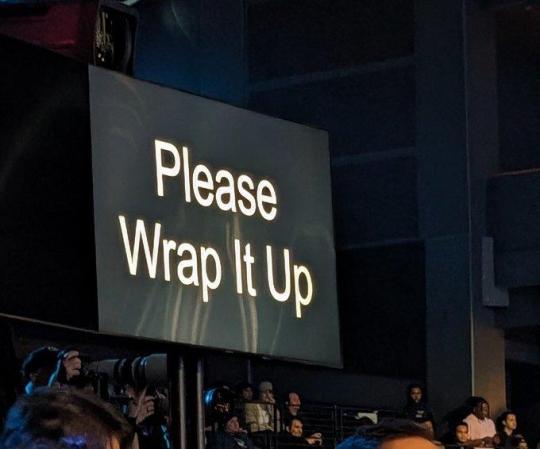
Current feelings. Also done after this, promise.
Hokazono-sensei isn't "cooked' or on a downswing, burning out early, deserving of being cancelled, or anything like that. I think we're just finally seeing the signs that he's a mangaka being serialised for the first time.
I still like the manga but I feel kind of isolated in being one of the apparent few that isn't having a good time with the story as it is right now. I've been waiting for the issues I've had with this arc to be resolved for a while but they seem to continue piling up. There will still be celebrations of hype moments and good writing but I'm not so keen on giving the author the benefit of the doubt any more.
I'm probably going to be more critical of the manga from hereon out so I don't mind if you unfollow me, dear void. I'm not above being a little anxious and upset when I see that folks have dropped me, but I also didn't start posting to gain a massive following. The idea was that I'd get my thoughts out there and hope a few folks were interested in what I had to say. That's happened and I don't want to chase validation through interaction numbers.
Right now I'm probably going to dial down the investment until either Hakuri comes back or we finally return to the Samura/Seitei War plotline. I feel like Hokazono tried to rush through this subplot with Iori and Hiruhiko as fast as he could to do just that, but that makes me ask a few questions.
What is the purpose of introducing Iori if we are trying to bumrush her big part of the story? Just to be a narrative tool? She's a contrast/compliment to Chihiro, a plot device, and a convenient excuse to get some fights on screen. But the execution was clumsy. It feels like she doesn't exist as a character herself but as a bundle of concepts to glue this arc's themes together and help the segue back into the main story.
Is this sort of thing going to happen every time the author wants to explore a new theme? Are we going to see Hakuri, Hiyuki, Shiba, Iori, and the rest shoved offscreen to introduce a new character tailor-made to explore things the way the author wants to instead of building on older ones? Hiyuki's a total unknown, why not use her? Why not give Shiba some screen time? I get that there are plans for them later on but frankly my patience has run out.
Are we going to see Chihiro running on fumes forever? Right now it doesn't seem like it matters that he's pushing himself too hard- he still got the better of Hiruhiko in round 2. I'm starting to get annoyed that we are being told Chihiro's exhausted, and sometimes shown it, but all of that goes out the window when it's time for him to look cool. Will this ever pay off in the narrative? If not, it's better to stop bringing it up so we stop thinking about it.
I'm still going to be here. I'm just not going to be glazing everything I like and hoping the things I don't like get better with future context any more. There's clear weaknesses in the writing that I can't overlook any longer. That said, I don't want each entry to become a negative rant, so moderation and objectivity as much as possible will be the name of the game.
Alright. If you got through all of this, thank you. Maybe see you next time if I'm still your cup of tea. If not, no hard feelings. Take care of yourself.
#kagurabachi#long post#kb ch70#Hakuri is a tank obviously#Whoever gets Tobiumne will probably be the support#I earned that terrible disfinger/disfigure pun and I will not apologise for it
28 notes
·
View notes
Text
What do postal service routes have to do with the national spy network, and how can it improve your worldbuidling? Find out this week as we conclude the Secret History of Byzantium! We conclude this epic text with a few final tales of vice, corruption, and an epic heist that you can set up for your players, too.
Join our discord community!
Check out our Tumblr for even more! Support us on patreon! Get your copy of Marginal Worlds, a deck of 50 magic items pulled directly from medieval manuscripts, built for any TTRPG system here!
Socials: Tumblr Website Bluesky Instagram Facebook
Citations & References:
The Secret History and another version
Wikipedia: Byzantine Coinage
Prices and Wages in the Byzantine World by Erion Hoxha - Link
Prices and Wages in the Byzantine World by Cecile Morrisson - Link
#maniculum#podcast#medieval#medieval literature#ttrpg#prokopios#procopius#anecdota#secret history#the secret history#d&d#dnd#dungeons and dragons
14 notes
·
View notes
Text
Mira Lazine at LGBTQ Nation:
The Bulgarian parliament voted to enact a law prohibiting the “propaganda” of “non-traditional” sexual orientation and gender identity in schools last Wednesday. Their vote triggered mass protests and public opposition. The proposed law states, “It is the educational function of the Bulgarian school that such a state institution should not be allowed to promote or incite, in any way, directly or indirectly, ideas and views related to non-traditional sexual orientation and/or identification of gender identity other than that which is biological.” The law, an amendment to the Pre-School and School Education Law, emerged after the 17-member Parliamentary Committee on Education and Science overwhelmingly approved it. The committee’s approval led to a four-hour debate last Wednesday that culminated in the bill passing through parliament. This bill was proposed previously, however, it failed in committee.
Of the 240 parliament members, 159 voted in favor of the first section of the bill, while 22 voted against and 13 abstained. For the section defining “non-traditional sexual orientation,” 135 voted for it, 57 against, and 8 abstained. Members of the more liberal parties were unable to vote for the first section for unknown reasons. The law was especially popular among the increasingly politically dominant pro-Kremlin Revival/Vazrazhdane Party, which was the party to introduce it.
[...] Over 7,000 citizen signatures and nearly 80 non-governmental organizations were sent to the government to plead that Bulgarian President Rumen Radev does not sign this bill. Belgian LGBTQ+ rights organization Forbidden Colors said in a statement, “It is deeply troubling to see Bulgaria adopting tactics from Russia’s anti-human rights playbook. Such actions are not only regressive but are also in direct contradiction to the values of equality and non-discrimination that the European Union stands for.”
A protest was announced the same day in Sofia, the capital of Bulgaria. Since then, there’s been widespread protests throughout the capital and Varna, a port city. There have also been petitions sent to the Bulgarian government asking them to oppose the measure. The bill defines “non-traditional sexual orientation” as “different from the generally accepted and the concept of emotional, romantic, sexual or sensual attraction between persons of opposites.” Bulgarian news site Clubz, as well as Parliament member Eleonora Belobradova claimed that this section of the bill was actually copy/pasted from the Bulgarian Wikipedia. Additionally, the bill only recognizes “biological sex,” completely writing trans people out of the law and ignoring intersex individuals entirely.
Protests erupt over Bulgarian parliament’s passage of Russia-style Don’t Say Gay or Trans law.
#Bulgaria#Anti LGBTQ+ Extremism#World News#Southeastern Europe#LGBTQ+#Don't Say Gay or Trans#Schools#Forbidden Colors#Transgender Erasure#Anti Trans Extremism
42 notes
·
View notes
Text
May Reading Recap
A Memory Called Empire and A Desolation Called Peace by Arkady Martine. Rereading A Memory Called Empire was a treat - an expected treat, but it was good to find out that it lived up to memory. I liked A Desolation Called Peace a little bit less, but only a little bit - it very much followed up directly on the themes from A Memory Called Empire that I appreciated.
The Last Graduate and The Golden Enclaves by Naomi Novik. I devoured these books. I'm very surprised by this fact, since I'm not generally a "magic school" person, but there we are; Naomi Novik apparently managed to make me one temporarily. The last book was a particularly strong one and did some very interesting things with its worldbuilding that'd been set up in previous books and delivered in the last one.
Armageddon: What the Bible Really Says About the End by Bart Ehrman. I've read and enjoyed some Bart Ehrman previously, but I feel like the quality of his books has diminished from his earlier work, and this book confirmed that for me. I'm a bit of an eschatology enthusiast (the main reason I picked this up, as well as the fact that (a) it was available at the library one time and I grabbed it on a whim and (b) author recognition), but I learned very little from this book that I didn't already know.
Strange Beasts of China by Yan Ge. One of the things that made me happiest about reading this book was, unfortunately, the fact that I thought I recognized the ways in which it was referring back to Classic of Mountains and Seas, which I felt (again, unfortunately) sort of smug about. Checking the Wikipedia page for the book, apparently "Additionally, each chapter begins with a brief description of the beast which, in the original writing, was written in Classical Chinese, while the rest of the book was written in standard Chinese," which is so cool and I wish had been conveyed in the translation.
In general though, this was a good one, though I feel like the descriptive copy was a little misleading. It's less a mystery than a series of interconnected stories following a central character investigating the titular strange beasts, and learning how they connect to her life and history.
Dark Heir by C.S. Pacat. I liked this one significantly more than Dark Rise - which I guess makes sense, since a lot of Dark Rise was setting up the concept that most compels me about the series (the main character being the reincarnation of a notorious villain from the past). It still feels YA in the way that YA usually does, which isn't necessarily a bad thing if stylistically less my preference (and something I feel worth mentioning in the context of a possible recommendation). The ending was a gut-punch of a fun kind. I will be looking forward to reading the third one.
"There Would Always Be a Fairy-Tale": Essays on Tolkien's Middle Earth by Verlyn Flieger. I loved Splintered Light and was disappointingly underwhelmed by most of the essays in this collection. There were a couple that were more interesting to me, but on the whole a lukewarm response.
The Doors of Eden by Adrian Tchaikovsky. Adrian Tchaikovsky wins again!!! I don't love this one quite as much as I've enjoyed the Children of Time series, but I actually think that I liked it more than The Final Architecture series. Fascinating concept, as usual fascinating worldbuilding for societies wildly different from our own, and dedicated to themes of cooperation and unity-across-difference without it feeling preachy or didactic.
Aphrodite and the Rabbis: How the Jews Adapted Roman Culture to Create Judaism as We Know It by Burton Visotzky. This was a good one! I already was familiar with some of the information here, but not all of it, and the work around art and architecture was new to me. I felt in some ways like Visotzky overstated his case a little, but on the whole a very interesting read.
Texts of Terror: Literary-Feminist Readings of Biblical Narratives by Phyllis Trible. This one is kind of a classic of feminist Bible scholarship - a short book that does a close reading of the text of the stories of four biblical women who suffer in some way (Hagar, Tamar, the unnamed woman from Judges 19, and Jephthah's daughter). It's a powerful work, though it felt a little basic to me on the whole - probably due to the fact that it's relatively early scholarship on the subject working from a literary angle.
Nevernight by Jay Kristoff. Books with footnotes are very hit-or-miss for me - not meaning books with contextual footnotes, but books with footnotes that are part of the conceit of the text itself. Some authors can pull it off; others really shouldn't try. In this case, the author felt a bit too taken with his own cleverness to pull it off; in general I felt like this book was trying a little too hard to be edgy and voice-y and ended up just feeling kind of shallow. It was a fun read, in some ways, but not a good one, and I'm torn on if I'm going to continue reading the series. If I do, it probably won't be in a hurry.
Tolkien and Alterity ed. by Christopher Vaccaro. I was excited about this particular collection of essays (you can probably guess why) and found them mostly uninspiring in the reading. The exception was a bibliographic essay on the treatment of race in Tolkien scholarship, which proposed more use of reader response theory, a suggestion which seems fruitful to me and more interesting than debates about whether or not Tolkien/his works are or aren't racist.
Knock Knock, Open Wide by Neil Sharpson. I feel like this is going to sound more critical than I really mean it to, but this was a perfectly adequate horror novel. I wouldn't call it exceptional, and it didn't freak me out, but I read it pretty much straight through and enjoyed the experience on the whole.
Thousand Autumns: vol. 4 by Meng Xi Shi. I liked this volume more than I've liked some of the others, and am enjoying the development of the central relationship, though I feel a little like I've been bait-and-switched about the level of fucked up that it's involved. Maybe that's why I'm enjoying this one a little less than I feel like I should: I was expecting more fucked-up between the two main characters based on the initial conceit and don't feel like the novel has really delivered on that. But I am enjoying Yan Wushi getting a little more...outwardly affectionate toward Shen Qiao, and Shen Qiao's concomitant confusion about it.
This Wretched Valley by Jenny Kiefer. More than an adequate horror novel but less than an excellent one, I felt like this book relied more on gross-out horror than I typically prefer. Still, was definitely spooky, and confirmed for me that wilderness horror gets to me in a very specific way.
I'm presently reading Goodbye to Berlin by Christopher Isherwood, which I have mixed feelings about (not negative! just mixed). I'm not sure what I'm going to read after that, save that I'm now trying to alternate genres and might try to read some nonfiction, which I've been sort of off for a while. Otherwise I'll probably just end up reading Translation State by Ann Leckie, and possibly A Fire in the Deep by Vernor Vinge. But I'm really going to try for some more nonfiction next month.
40 notes
·
View notes
Text

I've noticed this thing on Wikipedia where pages that aren't highly trafficked enough to regularly get eyeballs on them but are still adjacent to certain major topics are moderately likely to be written by PR flunkies, and I wonder what low-level employee for Singapore's ministry of water and sanitation was given the assignment "write a blatantly non-NPOV article on Singapore's water supply." Like at least try to not make this look like it was copy-pasted from a government website!
(I was curious about how Singapore managed the water issue, since for lots of big cities that's the thing that I would think would immediately kneecap any hope of political independence; turns out Singapore gets about 10% of its supply from desalination, 30% from water reclamation, 30% from rainfall/catchment, and 30% imported directly.)
44 notes
·
View notes
Text
I don't understand why people don't get that everything B/ryke touches get ruined. Yes, they came up with the idea of ATLA, but they weren't the ones who made the show the masterpiece it is. At this point, it's getting ridiculous how people are still falling into the trap of "If they stayed, live action would've been better".
(This is directly copied from The Last Airbender movie Wikipedia page)
Avatar: The Last Airbender co-creators Michael Dante DiMartino and Bryan Konietzko voiced their opinion in an interview regarding Shyamalan writing, directing, and producing the film. The two displayed much enthusiasm over Shyamalan's decision for the adaptation, stating that they admire his work and, in turn, he respects their material.[16] In a 2014 interview, Konietzko and DiMartino said that the project was given the go-ahead without their approval, and when they tried to provide input, it all got pushed to the wayside. Konietzko added even further that "A) We didn't want it to be done at all. Before anyone was attached, we didn't want it. And then B) If it was going to be done, we wanted to do it, but they weren't going to let us. C) When they attached Night, we just thought, 'Well, this is what we've been dealt. We'll just offer help when it's asked of us, and if it's not, we'll stay out of the way'. In the beginning, it was more positive and we offered help, but then we had a big falling out".[17]
This is not the first time we all agreed that a certain something never existed. (There is no ATLA movie in Ba Sing Se). This is the creative team behind the ATLA comic:
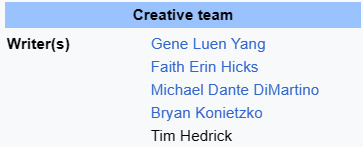
Oh and there's another very controversial show after ATLA. Some fans liked it. Some didn't. What is it again? The Legend Of Korra.
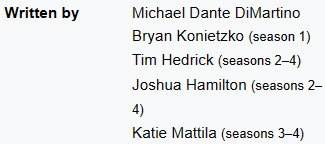
I know that there are several other small projects that did well, but don't you see the reoccurring pattern? Most of the times when any of these projects got criticized, they just threw all the blame on the writers they were working with.
50 notes
·
View notes